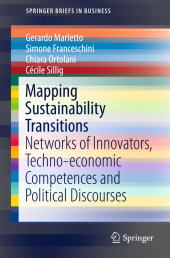 Neuerscheinungen 2016Stand: 2020-02-01 |
Schnellsuche
ISBN/Stichwort/Autor
|
Herderstraße 10
10625 Berlin
Tel.: 030 315 714 16
Fax 030 315 714 14
info@buchspektrum.de |

Simone Franceschini, Gerardo Marletto, Chiara Ortolani
(Beteiligte)
Mapping Sustainability Transitions
Networks of Innovators, Techno-economic Competences and Political Discourses
1st ed. 2016. 2016. xvii, 81 S. 27 SW-Abb. 235 mm
Verlag/Jahr: SPRINGER, BERLIN; SPRINGER INTERNATIONAL PUBLISHING 2016
ISBN: 3-319-42272-3 (3319422723)
Neue ISBN: 978-3-319-42272-5 (9783319422725)
Preis und Lieferzeit: Bitte klicken
This book was written for anyone wishing to understand how sustainable scenarios emerge from current innovations. It complements current sustainability transition research by providing a "socio-technical map," an analytical and operational tool that can be used to explain the current positioning of innovators and their networks; to form alternative transition pathways and scenarios; and to design policies for a sustainability transition. Drawing on multiple disciplinary approaches to the study of "green" innovations and focusing specifically on operational directives, it examines and assesses multiple transition pathways (and supporting networks). Lastly, it presents three sectorial case studies (urban mobility, agri-food, and lighting) to demonstrate how the "socio-technical map" can be concretely put into practice.
The socio-technical approach to the study of innovation.- Networks of innovators.- From networks of innovators to sustainability transitions.- How to build a socio-technical map.- How to build alternative transition pathways.- from scenarios to action: A backcasting exercise.- Agri-food.- Urban mobility.- Lighting.
The authors of this work are economists interested in innovations for sustainability, who consider innovation as the result of a complex techno-economic and socio-political process. Sharing a strong inter-disciplinary attitude; they have worked successfully with engineers, business economists, geographers, policy scientists, sociologists, mathematicians and statisticians.


